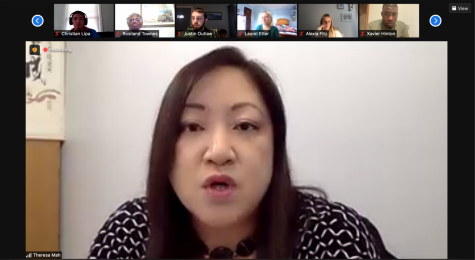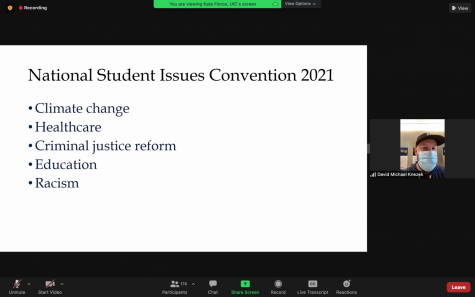Politicians Tell Students To Keep The Pressure On Their Elected Officials
October 25, 2021
As politics continue to dominate discussion in today’s climate, Michigan and Illinois state representatives pushed students to keep the pressure on their elected representatives and to advocate for issues they care about.

“Those of us who are in elected office, we listen to groups of organized advocates all the time. Individuals who worked together or worked with organizations that are set up to do this advocacy or have some tools that can help amplify your message,” said Illinois House representative Theresa Mah.
The National Student Issues Convention was hosted by Henry Ford Community College and University of Illinois Chicago on Oct. 22.
The objective of the event was to allow students to discuss issues important to them and democratically decide which issues would be presented to state representatives at the end of the session.
Henry Ford Community College President Russell A. Kavalhuna introduced the event as an opportunity for students to participate in a tradition of debating who we want to be as a country, a tradition that has been critical in America’s history.
Kavalhuna emphasized the goal was to practice engaging in politics through civil discourse. He stressed the importance of advocating for personal beliefs, while simultaneously listening to opposing beliefs on that issue with the intention of working together peacefully through disagreements and respectfully moving forward after coming to an agreement.
Elected officials on the call included Theresa Mah, the representative for the 2nd district in the Illinois House of Representatives, and David Knezek, the chief deputy director for Administration at the Michigan Department of Health and Human Services. Knezek served in the Michigan House of Representatives in 2012 when he was 26 years old and was elected to the Michigan Senate two years later.
Mah and Knezek answered questions and spoke to government policy relating to issues the students presented. Both representatives encouraged students to become involved in the political process through opportunities best suited to them such as internships, work opportunities and organizing groups to advocate for issues.
“It’s helpful to investigate what resources are out there and figure out how best you can organize,” said Mah.
Knezek encouraged students to petition their elected officials about issues they cared about. Giving an example from his time in the Michigan state legislature, he said that if one constituent called his office about an issue, it was noted and possibly addressed; but said many callers calling about an issue raises the priority to address it.

“If I got ten people to give me a call and talk about the same issue, it immediately shoots up to the top of the list,” said Knezek.
The event broke students into 12 groups where they were able to present issues important to them and select three issues to present to the entire group. After all groups listed the issues they chose, and made arguments why theirs should be presented, all the students were allowed to choose the top five issues. The process used a ranked-choice voting system.
Ranked-choice voting is an alternative electoral system that allows voters to select more than one candidate, ranking them in order of preference. After eight rounds, the top five issues were racism, climate change, healthcare, education and criminal justice reform.
Mah said the issues presented were urgent issues that impact quality of life and the futures of all the students on the call and outlined that four omnibus bills (bills that include many policy issues and/or topics) that were passed in the lame duck session had the objective of making progress for all of the issues presented. She stressed that for many issues like climate change, progress has to be made in slow incremental steps in ways that the existing systems are able to handle the changes, telling students to continue their advocacy and not to let up or become discouraged.
The event had participation from 10 colleges and universities across the country.



















